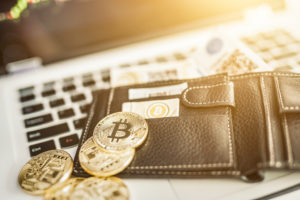Across the US, the country’s broken financial system is pushing people to seek out alternatives.
As the economy struggles with the impacts of COVID-19, traditional banks are failing to meet the needs of consumers—many groups, including racial minorities, face discrimination in the form of higher bank fees and barriers that make it difficult to open a bank account or manage their savings.
To fill this gap, Bitcoin ATMs are rolling out across the country at a rapid pace, offering a more democratic and inclusive alternative to the centralized banking system by providing an accessible gateway to cryptocurrency markets. But so far, the government in Washington has been slow to regulate cryptocurrency ATMs, effectively preventing a more egalitarian financial system.
This is in part because Bitcoin and Blockchain are still tied in the public imagination to money laundering and illicit finances. Anonymous transactions bring to mind headlines about dark web operations and backdoor financing. Washington’s apprehensive approach to Blockchain is also tied to distrust of tech giants like Facebook and Twitter.
According to Ben Weiss, COO of fintech firm CoinFlip, this skepticism of technology is justified. However, CoinFlip and other Bitcoin ATM providers are working to break down the stigma around cryptocurrency by encouraging widespread crypto adoption among underbanked populations who cannot properly access regular financial instruments.
Most Bitcoin ATM operators are fully compliant with FinCEN, a branch of the US Treasury that regulates financial transactions. If ATM operators do not follow existing laws, they risk being shut down. In Germany, the Federal Financial Supervisory Authority recently moved to close all unlicensed cryptocurrency operators. According to Blockchain analytics company Chainalysis, the majority of criminal activity via cryptocurrency is also traceable to a small subset of brokers. This is why leading operators like CoinFlip and Coinsource’s FinCen compliance is so crucial for the industry’s growth.
Bitcoin ATM operators around the globe are now working to shift public perception by showing how Blockchain provides essential services to those shut out of the financial system—to those unable to open bank accounts or who face physical or financial barriers to access. According to the FDIC, 25% of households in the US are unbanked or underbanked. Of these households, 30% said they avoid the financial system because they do not trust traditional banks.
“Institutional finance has not provided access to everyone and is still discriminatory,” said Weiss. “We [CoinFlip] provide financial services to unbanked or underbanked customers and believe that is the future of crypto: empowering more people with greater access to services by removing intermediaries.”
In many cases, cryptocurrency offers a solution to discrimination in the traditional banking system. According to a 2016 study, people of color pay significantly more to simply maintain a checking account than white customers: $262 more for Latinos, $190 more for blacks, and $25.50 more for Asian-Americans. A decentralized system like cryptocurrency is inherently more transparent and equitable.
As part of this effort, CoinFlip, now the world’s largest Bitcoin ATM operator, has been pushing US lawmakers to adopt concise and clear federal legislation on cryptocurrency. Existing regulations on cryptocurrency are convoluted and present a major barrier to growth. To meet public demand, Washington needs to adopt strong consumer protections, precise definitions, and transparent requirements for Blockchain finance.
Firms like Coinflip have already had success at the state level and their efforts seem to carry weight: since testifying in support of legislation in California and New Jersey, their model of maximum compliance and minimal fees has given them a strong reputation in the community.
According to Weiss, a bill under consideration in New Jersey “is likely to increase innovation by protecting consumers, legitimizing the [Blockchain] industry, increasing transparency, and shutting out bad actors.”
So far, CoinFlip has rolled out over 1,000 ATMs across the US and supports 10 major cryptocurrencies. The company has worked to meet soaring demand for cryptocurrency services, stemming from a Bitcoin craze that began in 2017 as well as a rush towards safe-haven assets amid COVID-19. As the market continues to grow and people seek alternatives to the broken banking system, leading Bitcoin ATM providers will remain focused on strengthening consumer protections.
“Creating strong consumer protections will keep bad actors from competing with legitimate products and help the crypto industry to gain legitimacy in the general public’s eyes,” said Weiss.
These efforts to support consumers and keep illicit entities out of the cryptocurrency system require a clear legal framework. Blockchain firms and consumers are working to build a more inclusive, transparent financial system but so far, most of the US legislature is lagging behind. The US has seen its share of the cryptocurrency industry decline by nearly 50% since 2012, in large part due to companies relocating to countries with more robust, transparent regulations.
Bitcoin ATMs offer crucial benefits that can meet the needs of US consumers and that the government in Washington must take advantage of. From serving the underbanked to making finance more accessible, Blockchain presents a vital pathway towards a more accountable, democratic financial system. Legislation needs to catch up.
